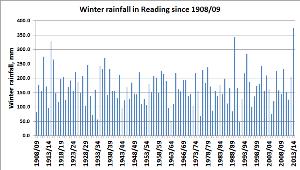Wettest February on record adds to winter of extremes
Release Date 03 March 2014

February 2014 was the wettest since records began more than 100 years ago, University of Reading meteorologists said.
At the end of a wet winter, February ended on a rainy note, with cloudy skies and rain from time to time circulating around an area of low pressure to the south of Reading.
According to Dr Roger Brugge, a meteorologist at the University, 117.2 mm of precipitation fell in Reading during February, making it the wettest February on record at the University. It was only the fifth February since 1908 to record at least 100 mm, with the total fall amounting to almost three times the normal February fall of 40.9 mm.
Dr Brugge said: "With winds from a mild south-westerly direction prevailing throughout the month, February was much milder than average. The average temperature overall of 6.9 °C was 2.1 degC above average making it the warmest February (along with 2011) since 2002."
The lowest temperature recorded at the University during this February was a relatively balmy 1.3 °C on the 16th, meaning that Reading (along with much of southern England and East Anglia) was free of air frost all month. Only in 1961, 1966 and 1990 has February been free of air frost before this at the University. The last day of February was the 31st consecutive day with temperatures remaining above 0 °C although on Saturday (1st March) the air temperature dropped to -0.6 °C under clear skies and in a light wind.
Dr Brugge added: "With 374.6 mm of rain falling this winter, it has been the wettest winter (and, indeed, wettest season of any name) in the University's rainfall record. Much of this winter rain fell in just 11 weeks, and the winter's fall represents 59 per cent of the annual average rainfall at the University.
"After a dry start to December, this winter's rain has tended to fall frequently with moderately large daily totals, rather than being due to a few exceptionally wet days. The number of days when 5 mm or more of rain fell totalled 28 this winter - more than in any other winter in the University's record. In fact only the only time when as many wet days occurred in three consecutive months was during October to December 1929 and November 1929 to January 1930 - both these periods also had 28 wet days.
"Only one day with slight sleet (during a short-lived shower) was observed at the University this winter; in Reading it is not uncommon for winters to have just one or two days of snow - or indeed, to be free of any snowfall at all."
Additional notes:
- Attached figure caption: The winter rainfall each year at the University of Reading from 1908/9 to 2013/14.
- Weather observations at the University of Reading are made at 0900 GMT each morning, under the guidance of the University's weather observer Mike Stroud.
- Weather records at the University date back to 1908.
Key statistics:
RAINFALL
- 117.2 mm in February, the wettest February on record.
- 374.6 mm of rain fell this winter, the wettest winter in the University's rainfall record.
- Much of this winter's rainfall fell in just 11 weeks, and represents 59 per cent of the annual average rainfall at the University.
AIR PRESSURE/WIND
- Average mean sea level pressure during February 997.6 mb, the lowest on record for any month.
- Air pressure this winter was been generally low after mid-December with frequent stormy spells in Reading. The average air pressure of 1004.7 mb was the lowest for a Reading winter since 1914/15.
- The peak wind gust occurred on Christmas Eve when 76 mph was recorded.
TEMPERATURE
- February average temperature at 6.9 °C was 2.1 degC above average making it the warmest February (along with 2011) since 2002.
- The lowest air temperature in February was 1.3 °C - so Reading was free of air frost in February. Not since 1961 has the coldest night in February been this mild.
- The last day of February was the 31st consecutive day with temperatures remaining above 0 °C although there was an air frost on 1 March.
- Each month this winter was warmer than normal, with the average temperature for the season of 6.5 °C making it the mildest winter since 2005/6.
- The lowest temperature recorded this winter was -3.8 °C on 12 January - this was the only morning when the air temperature reached -2 °C or lower.
- Air frosts were infrequent throughout the winter - only on 10 mornings did the air temperature drop below 0 °C, the fewest occasions since just 8 mornings in 1989/90.
